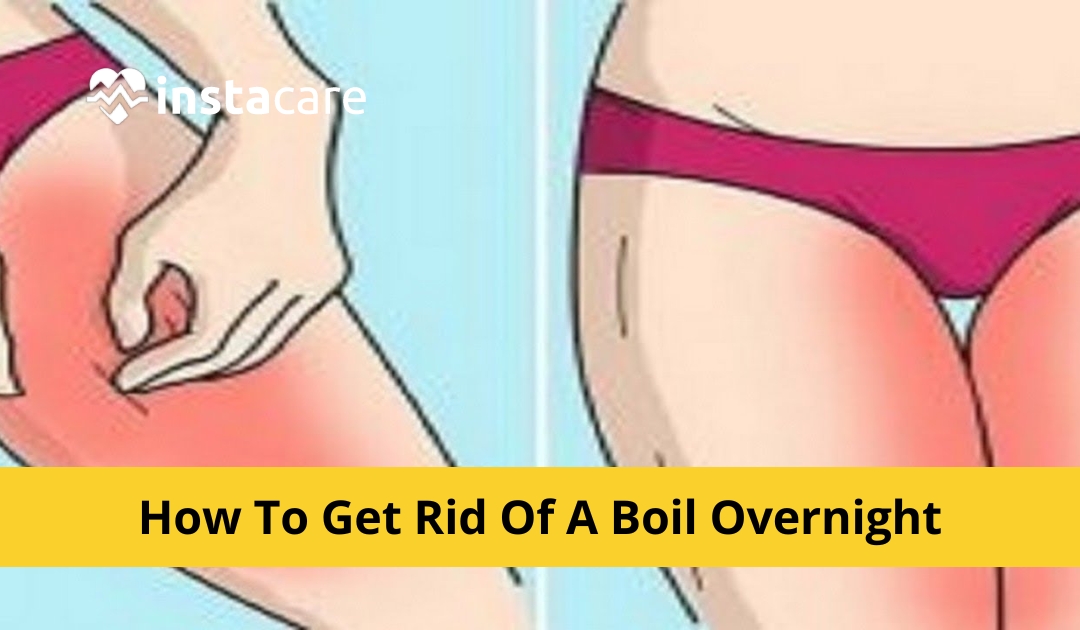No one likes to deal with unsightly boils on their body. Not only can they be painful and uncomfortable, but all too often they linger around for days or even weeks before going away. But don’t worry if you are suffering from a boil – there are a number of tried and tested methods that have proven effective at getting rid of them overnight! In this blog post, we'll cover all the best ways to get rid of a boil quickly and safely so you can start feeling better soon. You'll learn which treatments work, who should use each one, and how to successfully tackle your boil within 24 hours!
What is a boil?
Boils are skin infections caused by bacteria or, on rare occasions, a virus. These painful bumps may appear anywhere on the body but most often develop on the face, neck, shoulders, armpits and buttocks. Boils start as red, tender bumps and then fill with pus until they resemble an inflamed bump or nodule. The enlarged area around the infection is called a carbuncle and can be treated in similar ways as boils. Without proper medical treatment, boils can spread and become more severe or may require hospitalization in some cases. If not treated right away, those suffering from boils should seek professional medical help in order to avoid long-term complications of this serious skin condition.
What are the symptoms of one?
One disorder is a mental illness that can affect how an individual thinks, feels and behaves. Its symptoms can include changes in mood, changes in behavior, loss of interest in activities one usually enjoys, feeling down for long periods of time, difficulty concentrating on tasks or activities that used to be easy before, physical problems such as headaches and stomach aches, feeling of worthlessness or hopelessness and thoughts of suicide. It is important to recognize the symptoms to seek medical help if needed and it is equally important to talk to others you trust who can support you through your tough times. Mental health should never be taken lightly and getting the right treatment at the right time could help you manage your symptoms better.
Who gets a boil?
Boils, or skin abscesses, are most common in adults; typically between the ages of 20 and 40. Boils can appear anywhere on the body but the most common areas are the neck, face and torso. They occur when bacteria gets under the skin, often through a cut or scratch. People with poor hygiene, a weakened immune system or those living in unsanitary conditions have an increased risk of getting boils. It is important to remember that although they may be uncomfortable and unsightly, they rarely cause any serious health problems. Seeing a doctor is recommended if you develop a recurring boil as this could indicate an underlying condition such as diabetes.
How to treat small boils?
Treating small boils is relatively simple and straightforward. Boils are caused by bacteria getting under the skin, so it's important to kill the bacteria before trying to remove the boil. The best way to do this is by applying a warm compress several times per day for around 15 minutes each time. Soak a clean cloth in hot water and then apply it directly to the affected area until the cloth cools off, then repeat as necessary. Doing this will draw out any infection and help reduce irritation and pain. If needed, over-the-counter pain medications like ibuprofen can also be taken to bring down inflammation. It is important to avoid popping or lancing the boil yourself as doing so can cause additional bacteria to enter the wound making it worse.
How to treat large boils?
Treating large boils can be a challenging experience, but it's well worth the effort. In mild cases, allowing the boil to come to a head on its own and draining it of pus may be enough. In more serious cases, medical attention is recommended for proper drainage under sterile conditions. Never attempt to lance or squeeze the boil on your own, as this can cause infection. Medical intervention usually involves applying a local antibiotic cream and making an incision with a scalpel to drain the pus from inside through gentle pressure or suction. After proper drainage of the sore, patients should keep their affected area clean by washing daily with antibacterial soap. Bandaging the wound after draining will promote faster healing - as long as it is changed regularly so that air can freely circulate around the treated area.
Home Remedies for Boils
1- Applying heat
Applying heat is often used as one of the home remedies to try and get rid of a boil overnight. Different methods of applying heat can be quite effective and include soaking the area in hot water, using warm compresses, or taking a hot shower. Applying heat brings more blood and oxygen to the area, which can help reduce inflammation and speed up the healing process. Heat application should occur over regular intervals throughout the day, with no longer than 20-minute applications at a time to prevent further skin irritation. However, if you don't see any signs of improvement within two days, it's best to seek medical attention as there may be an underlying cause that requires treatment.
2- Tea tree oil
Tea tree oil is a home remedy that has been used for centuries to treat skin conditions like boils. Applying tea tree oil with a clean cotton swab directly to the boil can help speed up the healing process and provide soothing relief. The antibacterial, antimicrobial, antifungal, and anti-inflammatory properties of this potent home remedy can help get rid of the boil overnight. When applying tea tree oil, it's important to ensure that it is diluted with carrier oils such as eucalyptus oil or coconut oil and applied in small amounts, as undiluted tea tree oil might cause irritation on the skin.
3- Turmeric
Turmeric is a spice that has been used in home remedies to get rid of boils overnight. While it is not a guaranteed cure, turmeric is known for its anti-inflammatory and antibacterial properties, which make it an effective home treatment. To use this home remedy, mix half a teaspoon of turmeric powder and water to form a paste. Apply the paste directly onto the infected area with a bandage before going to sleep, as leaving it on overnight can have beneficial effects on the boil's healing process. One may also take turmeric supplements daily for added health benefits; however, if uncertain about taking them, consult a doctor before starting any herbal remedy or supplement regimen.
View More: 6 Effective Health Benefits of Turmeric
4- Castor oil
Used for centuries for both medicinal and practical purposes, castor oil is an easily accessible home remedy with a host of benefits. From treating joint and muscle irritations to home remedies to get rid of boils overnight, it's no surprise that castor oil is becoming increasingly popular as a home remedy. Not only is it loaded with anti-inflammatory properties that help reduce pain, irritation, and inflammation, but its antifungal, antiviral, and antibacterial properties make it an excellent home option for skin care and homeopathic treatments. With so many potential benefits and uses, it’s easy to see why castor oil is being praised as a wonder home remedy!
5- Neem oil
Neem oil is one of the home remedies commonly suggested for treating boils, especially those occurring on the skin. Derived from the Neem tree, this oil is rich in antioxidants and has both anti-inflammatory and antimicrobial properties. Applying a few drops of neem oil to the affected area before bedtime can help get rid of a boil overnight. To soothe any pain or discomfort associated with boils, it may also be helpful to take a warm bath with neem powder added to the water. Be sure to follow hygienic practices like washing hands and keeping the affected area clean as these will also aid in quick recovery from boils.
6- Raw onion
Raw onion has been said to be one of the home remedies to get rid of a boil overnight. The juice obtained by cutting a raw onion in half and applying it directly to the affected area can help draw out infection, reduce inflammation and pain, as well as promote moisture in the area for faster healing. Ideally, you will want to wrap a piece of gauze or muslin around the onion and then hold it against the boil. To maximize its benefits, you can also soak a cloth or bandage in this juice before applying it to the boil. Although this home remedy is considered safe, it's important to keep an eye on signs of skin irritation.
7- Fresh garlic
Fresh garlic is an often overlooked home remedy for many ailments, one of them being boils. Boils can be painful and unsightly, but fresh garlic has natural antibacterial and antifungal properties which make it ideal for treating skin issues like boils. All you need to do is put a few small pieces of garlic onto the boil, wrap the area with a cloth or bandage, leave it overnight and you’ll find that in the morning the boil will be significantly reduced in size. Garlic is also cheap and easy to obtain so this home remedy will help you get rid of your boil without breaking the bank.
8- Ginger
With its ability to reduce inflammation, ginger can be one of the most effective home remedies to get rid of a boil overnight. Not only can it help relieve pain and swelling in the area, but it also has antiseptic properties that are beneficial for healing boills from recurring. Moreover, its antibacterial properties can help fight off any potential infections. To use this home remedy, simply mix fresh ginger and water to form a paste or add some ground ginger powder with boiling hot water for a powerful tea solution. Both are effective for reducing the symptoms of boils quickly.
9- Boil complications
Boil complications are a very common affliction of the skin. If a boil is not treated promptly, it can lead to serious health risks. For example, if the boil is located near an area that is easily accessible by bacteria and other external agents, then it could potentially lead to sepsis. Additionally, repeated occurrences or large boils could even cause scarring or permanent disfigurement if left unaddressed. Despite how bothersome these infections can be, minor cases may be treated at home with basic wound-care practices; however, any boils that appear repeatedly or become exceptionally large should be checked on by a physician immediately in order to prevent further escalation of symptoms.
How to prevent boils?
Boils are painful skin infections that form when a hair follicle or oil gland gets infected. Preventing boils is largely dependent upon good hygiene habits and providing an environment to keep the skin in optimal condition. Start by gently washing the area twice a day with warm water and soap, ensuring to rinse away any sweat, dirt or oils. Additionally, keep the area dry and apply antibiotic ointment to areas of cracked skin or wounds. Avoid wearing tight-fitting clothes as they can cause chafing, which can impede the healing process of boils. Finally, if you're prone to developing boils, it's important to get regular medical check ups to manage any underlying infections that might be causing them.
Can I pop a boil?
Taking care of boils at home can be a tricky task, as there are potential risks involved if done improperly. Popping a boil is one such step that should not be done without thorough knowledge on the subject. The issue with popping boils is that it may open up other pathways for bacteria to spread, potentially leading to complications such as sepsis. Therefore, it’s important to consult with a medical professional if boil management is ever needed. That said, in clinical settings, minor procedures like incision and drainage or needle aspiration can be used to safely remove boils under professional supervision.
Can a boil go away without draining?
While it is possible for a boil to go away without draining, it is usually not recommended. Boils are usually caused by the staphylococcus bacteria, which can cause an infection if not effectively treated. A boil will often drain itself when any pus builds up in the center of it and treated with an antibiotic ointment applied directly to the skin. If a boil becomes large and painful, then your doctor may decide to lance it and provide further antibiotic treatment. It is important to seek advice from your doctor as soon as possible as boils can spread quickly, so they need prompt treatment.
Please book an appointment with the best Dermatologist in Lahore, Karachi, Islamabad, and all major cities of Pakistan through InstaCare, or call our helpline at 02137136090 to find a verified doctor for your disease.
Source: https://instacare.pk/blog/how-to-get-rid-of-a-boil-overnight











